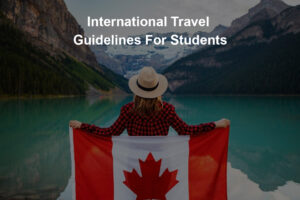The student route is one of the most popular ways to immigrate to Canada. However, this route is often expensive with tuition, residential, and licensing fees associated with the studying period. Moreover, students can work part-time, 20 hours a week.
What if there was a possibility for an individual to stay in Canada and enroll in a degree program without needing to apply for a study permit? Wouldn’t that offer easier solutions to millions of students who come to Canada each year and have to fret over the hefty tuition fees and strenuous documentation process? Although this is not a traditional route, it’s always important to gain clarity on all possible options before taking any further decisions.
To get a better overview of a scenario like this, let’s first try and understand who exactly needs a valid study permit to stay in Canada.
Why Would You Need a Study Permit?
The study permit is the document that aligns with your student visa, which further dictates the expiry date of your Social Insurance Number (SIN). In essence, without a study permit, you would not be allowed to enter Canada, attend classes at your Designated Learning Institution (DLI), or work for 20 hours every week – like every other international student.
In essence, every student taking up a course at a DLI and focusing on a work free permit/post-graduate work permit right after the course ends will have to take up a study permit.
Who Does Not Need a Study Permit?
Certain groups of people do not require a study permit to come and study in Canada. Here are a few of them.
1. Minor Children
The definition of minor children changes for each province:
| Province | Minor Age Limit |
| Alberta | < 18 Years |
| Manitoba | < 18 Years |
| Ontario | < 18 Years |
| Prince Edward Island | < 18 Years |
| Quebec | < 18 Years |
| Saskatchewan | < 18 Years |
| British Columbia | < 19 Years |
| New Brunswick | < 19 Years |
| Newfoundland & Labrador | < 19 Years |
| Nova Scotia | < 19 Years |
| Northwest Territories | < 19 Years |
| Nunavut | < 19 Years |
| Yukon | < 19 Years |
Minor children can have their parents in any of the following situations to qualify for studying in Canada without a study permit:
- Working on an open or closed work permit in Canada.
- Studying in Canada on a study permit.
- Stay in Canada as a temporary resident.
- Stay in Canada as a permanent resident or citizen.
2. Students Willing to Take Short-Term Courses Under R188(1)(C).
Section 188 of IRPR details the different conditions under which foreign citizens can come to Canada and attend short-term courses, which are defined as the courses which are not designed to last for more than six months and are offered by a Designated Learning Institution (DLI).
Under this regulation, if the international student plans to come to Canada and take the short-term course, which will last for six months or less, they might not need a study permit altogether. The course’s duration is the critical parameter to determine whether it qualifies as a short-term course or not. Thus, even if you plan to study for only three months in Canada for a 12-month course, you will need a study permit.
However, our experts recommend such students apply for a study permit nevertheless. We have noticed that the situations for students can often change – the course might take longer than expected, or you might want to take a subsequent course right after your initial course ends. You cannot apply for a study permit if you are already in Canada.
Hence, as a workaround for such extensions, you should apply for a study permit even if you do not need it for your short-term courses. This study permit will help you participate in the study and work arrangements (i.e., Co-op programs) if your short-term course is eligible for one.
3. Courses Offered by Non-DLIs and High-School Exchange Programs
These are two streams that allow you to come and study in Canada without a study permit:
1. Non-DLI Schools
If a particular school hasn’t been designated by the provincial or territorial authorities as a DLI, it isn’t eligible to grant admission to international students.
So, if a student submits a study permit for a Non-DLI school, it will definitely be refused and hence if one is pursuing a short-term course at an institution which isn’t enlisted as a DLI, obtaining a study permit is not essential. This means that a student can come to Canada finish their short-term course and go back without having a study permit.
But, when applying for an extension, work permit or to work on a part-time basis, having a study permit is essential.
2. High-School Exchange Program
Most high school exchange programs fall in Grade 12 and usually last for about ten months. However, if you have managed to find a program that will last only for one semester or six months, you might be able to attend it in-person, in Canada, and without a study permit. But, if you come from one of the countries whose citizens require a visa to come to Canada, you will need a Travel Document (TRV) to come to Canada – even if you are coming for this particular program.
Should You Take the No Study Permit Route?
After taking in all the information, you might want to run a few scenarios and see if you need a study permit for your plans to travel to, study, or build a career in Canada.
1. Can You Keep Extending Your Short-Term Course?
Here is a thought experiment for you – let’s assume you come to Canada to take a short- term course. By design, you don’t need a study permit for this course. You take the course and then see the opening for another course offered by the same DLI. You take it up. And by the time you finish the second course, you have enough credits to call it a certificate or even a degree. So, did you manage to get a degree in Canada without a study permit?
Paragraph R188 was not designed to allow foreign nationals and leverage the short-term course policies to study without a study permit in Canada. Hence, if you want to extend your studies beyond a short course, you need a study permit.
These are few of the scenarios to be considered while checking whether a study permit is needed or not
- A student plans to come to Canada for a program of less than 6 months at a post-secondary DLI – Not needed
- A student plans to come to Canada for a program of less than 6 months at a post-secondary institution that has not been designated to host international students- Not needed
- A student plans to come to Canada for a one-semester (4 months) Grade 12 high school exchange program – Not needed
- A student plans to come to Canada for Grade 12 in a non-semester school system (but not through an exchange program) – Needed
- A student plans to come to Canada for a 4-month university exchange program and wants to be able to work on campus – Needed
- A student plans to come to Canada to attend a 4-month English as a second language ESL or French as a second language FSL course at a DLI and is thinking of following up the course with a 3-month computer course at the same DLI – Needed
- A student plans to come to Canada to take a 5-month course at a DLI during which they will be required to work as a chef in a restaurant for a month – Needed
In Summary
We hope that you are able to get a better understanding of who is exempt from a study permit. However, if you still have doubts or need additional information, please contact us at info@ovationimmigration.com




